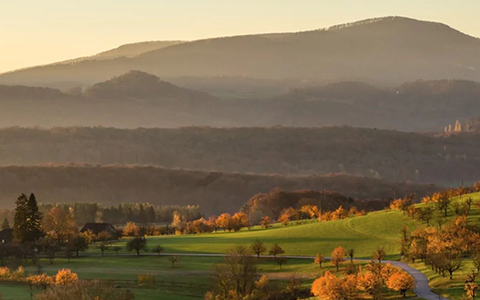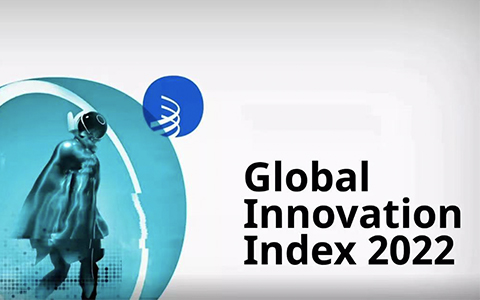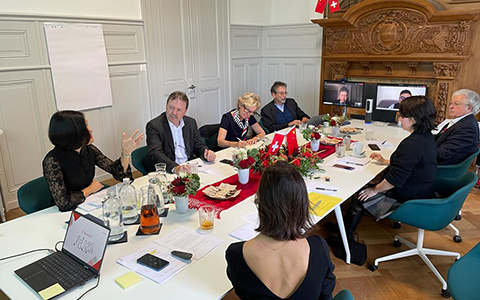 金秋叶落,拾起一片你的瑞士记忆
金秋叶落,拾起一片你的瑞士记忆
金秋叶落,拾起一片你的瑞士记忆 层林尽染的瑞士大地上, 哪一片秋叶承载着你的记忆? 📍:Graubunden, Switzerland 树叶染上金黄或橙红色, 奶牛从高山牧场返回, 鲜花点缀着餐桌,时令特色菜摆上餐桌。 一切线索都指向秋天的来临, 这个瑞士最丰富多彩的季节。 📍:Nuglar-St.Pantaleon, Switzerland 还有什么能比穿过色彩缤纷的森林、 跳进树叶堆中、享受森林的宁静 更美好呢? 树木在冬眠之前展示最美的自己, 我们在秋叶林间重拾有关瑞士的记忆。 📍:Spiez, Switzerland 在秋高气爽时一起重游瑞士吧, 去色彩的海洋中扬帆远航, 再次奔向记忆中的瑞士美景! 漫步秋野,重返大自然 秋风吹过树叶沙沙作响, 金色的秋日阳光照耀着 大自然最迷人的缤纷色彩。 想要最细致、最亲密地与大地重逢, 那就趁着秋日的黄金假期, 走进瑞士的公园、小径和无尽自然。 📍:Scuol, Zurich region 沿着恩嘎丁小径(Via Engiadina)漫步,去看那里金黄色的落叶松。从马洛亚出发,经Grevasalvas到圣莫里茨,再经Muntatsch高山牧场到达萨梅丹。 从马洛亚的高原与湖泊到萨梅丹阳光明媚的山谷,落叶松迷人的金色树冠会伴随你一路。 📍:Sils, Engadine 在上巴塞尔地区,来一次山水相逢的秋日徒步。从赖戈德斯维尔的瀑布缆车停车场出发,会经过很多小瀑布,向Hintere Egg进发,沿途设有烧烤区可以稍作休息,坐下来欣赏令人赞叹的美丽全景。 继续前行,到达约500米外的切勒霍普弗里(Chellechöpfli),在那里可以欣赏到索洛图恩汝拉的壮丽景色。 📍:上巴塞尔地区,Passwang秋雾弥漫的树林 从 Bütschel/Gschneit 附近的 Sternen餐厅出发,沿着小径来到塔维尔纪念碑,这里有长椅供游客坐下来欣赏图恩湖、尼森和施托克峰的景色。 继续沿着Bütschelegg的路标前行,到达 Bütschelegg 山顶后,可以在视野辽阔的观景台欣赏美妙的秋色。 📍:Buetschelegg, Bern 📸: myswitzerland.com 走过山间,也去河边感受一二清新的水汽。秋天沿着杜河徒步,放松身心,愉悦心情,享受远离城市喧嚣的原生态大自然,没有比这更美好的事情了。 在汝拉三湖地区,从 Goumois 至 Soubey,沿着杜河一路前行。潺潺的河水、沙沙作响的落叶、色彩绚丽的秋叶,一定会让你心醉神迷。 📍:Goumois, Doubs 📸: myswitzerland.com 环湖一圈感受浸爽的秋意,也是不错的选择。碧绿的湖水会与金色的秋叶形成色彩鲜明的对比,在你眼底画下难以忘怀的秋景。 紧邻格吕耶尔湖岸的这条环形徒步线路全长约44公里,你将漫步在落叶和常绿树木的树荫下,穿过保留着格吕耶尔旧日风貌的村庄。金色的云杉、落叶松和山毛榉,烘托出格吕耶尔湖畔迷人的氛围。 📍:Gruyere, Switzerland 📸: myswitzerland.com 山毛榉树是瑞士高原和阿尔卑斯山麓地区最常见的树种,是瑞士秋季落叶的主要四个树种之一。从阿尔高汝拉公园的小径出发,沿着起伏的山丘前往美丽的山墙城市阿劳。途中将经过诸多森林、金色山毛榉树林、色彩绚丽的田野,还有几座可以俯瞰瑞士高原、阿尔卑斯山甚至德国美景的观景台。 阿尔高汝拉公园蕴藏着大量的自然宝藏:稀疏的松树林、开满兰花的山坡、遍布岩石的草原、干草场以及梯田式的葡萄园。 📍:Aargau Jura Park 📸: myswitzerland.com 在离城市咫尺之遥的地方,也有绚丽多彩的秋色。登上玉特利山,可以欣赏到苏黎世城市建筑群、波光粼粼的湖泊、阿尔比斯山脉和阿尔卑斯山的壮丽全景。 沿着起伏的山路愉快地徒步1.5小时之后,到达费森尼格。然后继续朝 Albispasshöhe 方向前进,从这里可以继续前行或乘坐巴士返回塔尔维尔。这绝对是一趟充满收获的秋季徒步之旅。 📍:Albis, Zuerichsee 📸: myswitzerland.com 金黄色的除了山毛榉和落叶松,还有成片的葡萄园。秋天在孔泰葡萄园徒步是一种特别的享受。斟一杯孔泰葡萄酒,与当地特色菜肴搭配——熏鳟鱼、烤羊肉、阿尔卑斯奶酪,只是想象似乎都能闻到香味啦! 品尝美食期间,还可以了解不同类型的葡萄酒、当地气候、植物生长,以及金色葡萄园等有趣的信息。 📍:Conthey, Herbst Panorama 📸: myswitzerland.com 还有一处葡萄园绝对不容错过,那就是于2007 年被联合国教科文组织列为世界遗产的拉沃梯田葡萄园。 从圣萨风宁的小径前往吕特里,欣赏日内瓦湖和周围群山的壮丽美景。金色的葡萄园梯田尽收眼底,还要记得千万别错过酒窖和传统小酒馆哦! 📍:Epesses, Lavaux 走过小径和公园,城堡里的秋天也值得一看。漫步在拥有骑士大厅、炮塔、城垛、防御墙和花园的城堡本身就是一种奇妙的体验。 走进已经矗立800年的格吕耶尔城堡(Gruyères Castle),回顾悠久而迷人的历史,发现古老城堡的宝藏传说。 📍:格吕耶尔城堡 📸: myswitzerland.com 在这个一切都感到充实的秋天,偶遇野生动物的机会也会增加。阿尔卑斯野山羊、胡兀鹫或者海狸,只要抓住机会,就能一睹它们的英姿。 阿尔卑斯羱羊 金色旅程,穿越远秋景 走累了吗?但眼睛可还没看饱。 乘上火车或者开启自驾模式, 穿过田园,穿过城镇, 浓浓秋意弥漫在无边的景色中, 等待你的路过。 📍:Intragna, Centovalli 乘坐火车穿越绚丽的美景,是走进秋日的最佳方式之一。秋天一定不能错过的火车线路,金色山口全景列车排在第一位。 这条全景线路因其金色的秋景而闻名。第一批讲英语的游客报道了这里美丽的秋色,说他们在这里度过了“金色时光”。如今,金色山口仍以此名字命名,因为沿途的秋叶令人印象极为深刻。 📍:Lavaux, Switzerland 豪华全景观列车从伯尔尼高地的茨魏西门悠然地蜿蜒前行,前往日内瓦湖畔的时尚小镇蒙特勒。在鲁杰蒙—罗西尼耶尔—蒙特巴瓦 (Rougement–Rossinière–Montbovon)线路,你一定能拍到属于你的#最佳秋景。 📍:Lavaux, GoldenPass Panoramic 与金色山口列车同一线路,还有一趟能带你穿越时空的复古列车。乘坐茨魏西门至蒙特勒的金色山口美好时代列车,一踏进车厢,仿佛进入了往昔岁月。这趟列车内饰采用优质木材装饰得十分精美。 坐在奢华的柔软座椅上,欣赏窗外的美丽秋景,还可以在旅途中点一小盘地方特色美味。 📍:金色山口美好时代列车 怎么能忘记冰川快车呢?这趟列车不仅带你在冬日前往雪国,也会带你领略瑞士最美的秋景。 从雄伟的马特宏峰到波光粼粼的恩加丁湖环绕的圣莫里茨,搭乘世界上最慢的特快列车,穿越金灿灿的落叶松林和生机勃勃的落叶树林。 📍:Glacier Express on the Albula Line 同属雷蒂亚铁路(RhB)的伯尔尼纳快车,也为你准备了如画的秋景。 📍:Bernina Express 蔚蓝色的天空、金色的落叶松、波光粼粼的湖泊和白雪皑皑的山峰——秋季的格劳宾登州展现出自己最美好的一面。 📍:Bernina Express 阿尔布拉/伯尔尼纳段线路2008年就被联合国教科文组织列为世界遗产。享受这里的顶级秋天吧! 📍:世界遗产线路上的布鲁西奥大回环 采尔马特—戈尔内格拉特线路是欧洲最高的露天齿轨铁路,一年四季将游客从采尔马特火车站直接运送到戈尔内格拉特山顶。 📍:Gornergrat Railway, Valais 列车爬升1469米,穿过令人壮观的桥梁、地下走廊和隧道,沿途经过石松和金色落叶松林、岩石峡谷和波光粼粼的高山湖泊。仅仅33分钟之后,马特宏峰就映入眼帘,在水晶般清爽的秋风中显得格外耀眼。 📍:Gornergrat Railway, Matterhorn 美食美酒,自然疗愈时 丰收之秋,充实之秋, 去大自然中走完一段旅程, 就该饱餐一顿美食、享受一次Spa。 让瑞士的秋天治愈你的一切烦忧! 秋季是瑞士美味狩猎季。从乡村小酒馆到美食餐厅,到处都有野味,从鹿、野猪到岩羚羊、松鸡,有时甚至还有阿尔卑斯野山羊和沙锥鸟。 走进一家餐厅看看他们的菜单,如果能找到不少野味佳肴,那么餐厅老板通常也是位猎人。碰上这样的好运气,绝对应该尝一尝! 📍:阿德勒餐厅
📷:myseitzerland.com狩猎季期间,在位于弗莱施的阿德勒餐厅总是能品尝到野味。毕竟,如果在格劳宾登州开餐厅,也一定会与狩猎区保持密切的联系。 主厨 Siggi Tschurtschenthaler 邀请游客参加富有传奇的狩猎之夜活动时,就变得更精彩了。餐厅老板来自南蒂罗尔,也是一位葡萄酒鉴赏家,收集了众多来自格劳宾登州、南蒂罗尔和尚帕涅的好酒,数量惊人。 在葡萄香气弥漫的秋天,最应该去的就是葡萄园中的餐厅。在葡萄树之间尽情享用美味吧! Tout un Monde位于拉沃梯田葡萄园,坐拥这里最美丽的露台。在玻璃房中享用来自当地的特色菜与葡萄酒,体验如此美妙的秋天。 📷:toutunmonde.ch 想要完全放松身心,那就在瑞士如诗如画的迷人户外放松一下吧!在天然泳池中感受清凉、体验森林浴、在能够欣赏到阿尔卑斯山的热水浴缸中放松…… 瑞士的天然温泉能满足你的一切需求。获得灵感,寻找最美丽的地方,远离工作和日常烦恼,放松身心,尽情享受瑞士秋天的亮丽色彩。 📷:myseitzerland.com 在自然中享受疗愈,在舒适的 “Alpenbritsche”过夜,在绿茵茵的草地上欣赏美丽的星空,在自带泉水和美景的热水浴缸休闲放松。 或者在恩嘎丁群山中寻找宁静,寻找内在的自我。蓬特雷西纳的克罗能霍夫大酒店(Grand Hotel Kronenhof)提供户外瑜伽课程。远处熠熠发光的洛塞克冰川和附近溪水的潺潺流动声,为充满活力和放松身心的瑜伽时间营造出独特的氛围。 热水浴缸 / 户外瑜伽 如果不在大型水疗区,回到酒店房间同样也能放松一下。对于不想错过养生的游客来说,设有水疗设施的酒店一定是个好选择。 除了绝佳的公共水疗中心,这些酒店还提供独具特色的客房和套间,每个房间都拥有自己的专属水疗区。 📍:The Alpina Gstaad / Grand Resort Bad Ragaz 熟悉的景色染上秋意后, 更添一分多彩与活泼。 在这个明朗的秋日, 我们去瑞士拾起金色的落叶,
也拾起记忆中的金色时光。 哪一片秋叶里藏着你的瑞士记忆? 哪一次瑞士旅程让你时时回想? 欢迎在留言区分享你的瑞士记忆 本文转载自瑞士国家旅游局,如有侵权,敬请告知删除。 Sooswiss为您提供 瑞士方向私人管家式的定制服务: 1)家族传承 2)财富管理 3)瑞士投资 4)居留计划 5)税务优化 6)家族治理 更多资讯请登录网站 www.sooswiss.com

 供应链从全球化分工向消费市场靠拢(上)
供应链从全球化分工向消费市场靠拢(上)
 瑞士连续12年被评为全球最具创新性国家
瑞士连续12年被评为全球最具创新性国家
 金秋叶落,拾起一片你的瑞士记忆
金秋叶落,拾起一片你的瑞士记忆
 雷梭勒十周年庆祝活动:第一届顾问委员会会议在纳沙泰尔举行
雷梭勒十周年庆祝活动:第一届顾问委员会会议在纳沙泰尔举行